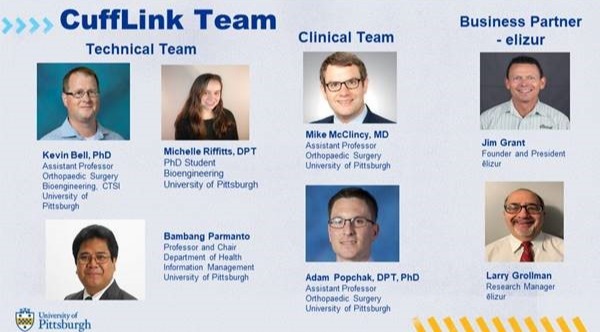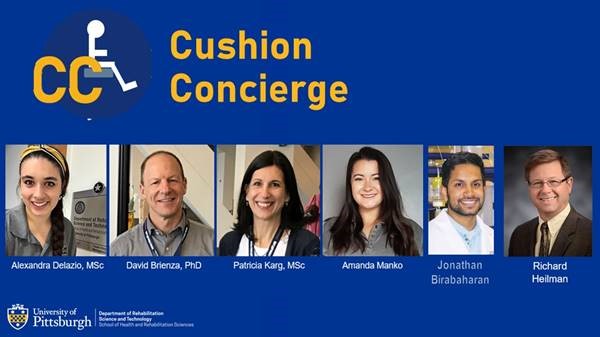Two innovation teams from the School of Rehabilitation Sciences (SHRS) were awarded $10,000 each to advance their projects towards the market and the clinic in the second annual SHRS Innovation Challenge.
Conducted in conjunction with the University of Pittsburgh Innovation Institute’s First Gear commercialization program, the challenge was introduced in 2019 to foster increased participation in commercial translation at SHRS.
The awards, provided by the SHRS Office of the Dean, went to team CuffLink and team Cushion Concierge.
The CuffLink team is developing a remote rehabilitation system for rotator cuff injuries.

The technology is being co-developed in partnership with Elizur Corporation, a medical equipment company that has licensed the underlying software from the University.
Team CuffLink members included Principal Investigator (PI) Dr. Kevin Bell, assistant professor in the Department of Orthopaedic Surgery and Bioengineering, Entrepreneurial Lead (EL) Michelle Riffitts, Graduate Student Researcher, Bioengineering Department, and Industry Mentors (M) Robert Huemmrich and Larry Grollman. The project is a collaboration of the Department of Bioengineering at the Swanson School of Engineering, together with Bambang Parmanto, Chair of the Health Information Management Department at SHRS and a clinical team consisting of Michael McClincy, assistant professor in the Department of Orthopaedic Surgery, and Adam Popchak, research assistant professor in the Department of Physical Therapy at SHRS.
There are more than 250,000 rotator cuff surgeries performed in the U.S. each year that require extensive outpatient physical therapy.
But not all patients complete the therapy, often because they exceed the number of visits allowed by their insurance coverage. This can lead to lead to stiffness and re-tears, resulting in even higher medical costs and patient discomfort.
The CuffLink system is designed to allow patients to complete early rehab at their home, saving physical therapy visits for the later stage of rehabilitation. The device has sensors that communicate with an app that gives patients real-time feedback and provides clinicians with remote data to monitor patient progress.
"First Gear was very beneficial in helping to identify our customers and their needs in order to move the Cufflink forward," Popchak said. "We are extremely grateful to have had the opportunity and plan on using the award to develop a functional Cufflink device for reliability and acceptability testing. Moving forward, this award will allow us to pursue NIH funding and develop a plan for regulatory approval prior to commercialization."
The other $10,000 recipient is Cushion Concierge. The team is seeking to bring relief to the more than 2.5 million people who develop pressure injuries each year, including wheelchair users, approximately 70,000 of whom die from those injuries.

They are developing a web-based information tool that will allow healthcare professionals to identify the appropriate wheelchair cushions for their clients.
The team includes PI’s David Brienza, associate dean for technology and innovation at SHRS, and Tricia Karg, associate professor in the Department of Rehabilitation Science and Technology and EL’s Alexandra Delazio, a medical product engineer who runs the cushion test laboratory and Amanda Manko, Pre Doctoral Research Fellow. They are mentored by Dick Heilman, an experienced marketing and operations executive and received additional student support from Jonathan Birabaharan, a graduate student in the School of Pharmacy.
"Our goal going into First Gear was to design a tool, Cushion Concierge, that links to the data that we collect in our lab on wheelchair cushion performance with the needs of those who use this assistive technology," Delazio said. "The First Gear curriculum encouraged our team to connect with a network of healthcare professionals, wheelchair users and manufacturers who provided us with invaluable information on how best to serve our target customer base. We were also connected with an entrepreneurial mentor, Richard Heilman, who passionately led us through this process from day one."
Delazio said the award money will be used to create a fully functional prototype of the Cushion Concierge tool.
The First Gear program, offered by the Innovation institute, consists of six workshops where Pitt innovation teams, consisting of a principal investigator, an entrepreneurial lead, typically a graduate student or postdoc in the investigator’s lab/school, and an experienced a business mentor.
Each team receives $3,000 to assist in conducting market research, including interviewing potential customers. The next cohort begins May 13. Click here to learn more and apply.
The other teams participating in the spring 2020 cohort of First Gear included:
SHINE (Screen Hearing in Noise Effectively)
A pediatric headphone that can evaluate ambient room noise in real-time and indicate to screeners if noise levels are too high to obtain accurate test results.
PI’s: Kathleen Vellody and Nicole Corbin
EL: Elizabeth Larget
M: Alex Trader
HyFi Audio
HyFi uses novel 3D scanning and printing technology with traditional sound recording techniques and machine learning approaches to provide the recording, film, and video game industries with a unique inexpensive sound quality advancement that provides an individualized highly immersive auditory experience to the listener.
PI: Christopher Brown
M: Alexander Polzin